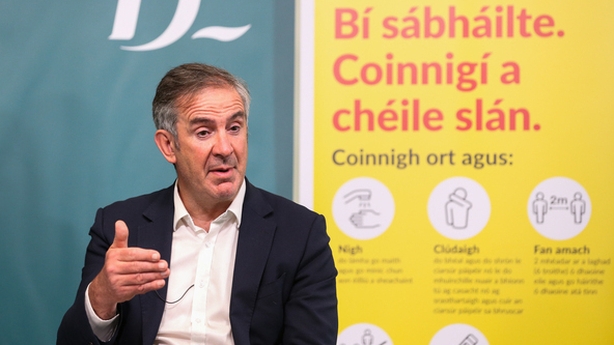The Health Service Executive has expressed concern at rising cases of respiratory illnesses such as RSV, as well as flu and Covid-19, heaping pressure on the health system as winter approaches.
RSV in particular is already having an increasing impact on paediatric units.
The HSE last week told hospitals to ensure there is "robust" planning to manage the current high trolley numbers, as such illnesses impact the system.
Last month saw over 10,600 patients spend time on a trolley before securing a bed, according to the INMO, with 393 of those being children.
The INMO said last month was the worst month for paediatric overcrowding on record.
It said that this morning there were 554 admitted patients waiting for a hospital bed.
The hospital worst affected was University Hospital Limerick, with 75 patients waiting for a bed, with 58 at Sligo University Hospital, 51 at Letterkenny University Hospital, 50 at Cork University Hospital and 40 at St Vincent's University Hospital in Dublin.
There were 28 admitted patients waiting for a bed at three children's hospitals - 15 at Children's Health Ireland, Crumlin; eight at CHI Temple Street and five at the National Children's Hospital Tallaght.
Speaking on RTÉ's Morning Ireland, HSE Chief Operations Officer Damien McCallion said there were "a couple of factors" behind why such large numbers of people were left waiting for admission last month, adding that the HSE saw pressure on emergency departments right throughout the summer and autumn.
Attendance numbers at EDs rose by roughly 5%, he said.
"That might not seem like a lot, but in a system that is at max capacity coming out of a pandemic and also trying to address waiting list pressures, that is a significant increase in patients," he added.
Another factor, he said, was that the nature of patients was changing, with more and more elderly patients presenting.

Mr McCallion said that increasing bed capacity, as well as opening services to prevent hospital admissions in the first instance, were among the actions the HSE is taking to counter rising numbers attending hospitals.
Attracting and retaining staff in the healthcare system also remained a challenge, he said.
Asked if the rising numbers attending hospitals has led to appointments or operations being cancelled, Mr McCallion said that such calls would be made "at site level on a daily basis", however he added that there would "undoubtedly" be situations where some procedures would be cancelled.
He also said the HSE was trying to avoid a winter of lengthy waits and cancelled appointments.
"Our job is to try to minimise that for people. This is an international phenomenon in terms of the numbers we're seeing coming through that’s happening in most health systems around the world. What we’re trying to do is have more services available that would prevent having to go to an emergency department," he said.
Mr McCallion said that "at some point" over the winter, the HSE does expect to see a surge in Covid-19 cases. Cases steadily increased throughout last month, with 441 people in hospital this morning.
"We’re trying to plan for those eventualities," he added.
Asked about delayed cancer diagnoses following the pandemic, Mr McCallion said it would "take some time" to have factual data through the cancer registry, adding that cancer was always prioritised through the pandemic, but the HSE "accepts there was an impact for patients".
He said the HSE was now running additional clinics, insourcing option, and running clinics at evenings and weekends, adding that cancer services have received additional investment.
"There will be challenges but in relation to cancer services there is still additional investment, we are actively recruiting and the intention is to continue to do that".
Speaking on the same programme, Consultant Medical Oncologist Professor Seamus O'Reilly, who works in Cork, said there would be "tragedy" for society if lessons are not learned from the pandemic and reform is not made in the system.
He said that there were more cancer diagnoses through rapid access clinics for the first six months of this year alone than the whole of 2019, adding that those who have been diagnosed are saying they have had cancer symptoms for months before seeking medical attention.
Prof O'Reilly said recruitment and retention of health staff needs to be accelerated, as it can take up to two years to replace someone who has left.
"That was done in the past to save money... our society can’t afford that now," he said.

